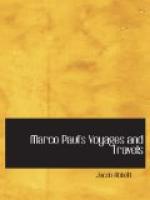“A load of grass”—said Forester.
“A load of grass!” repeated Marco, laughing.
“Yes, dried grass, that is, hay. Hay, you know, is grass dried to preserve it.”
“Very well,” said Marco; “go on.”
“A load of grass, then, is so cheap, that the cost of hauling it fifty miles would be more than it is worth. But cotton is worth a great deal more, in proportion to its bulk. It can therefore be transported to distant places to be sold and manufactured. Thus the enormous quantity of cotton which grows every summer in the southern states, is packed in bags, very tight, and is hauled to the rivers and creeks, and there it is put into steamboats and sent to the great seaports, and at the seaports it is put into ships, which carry it to England or to the northern states, to be manufactured; and it is so valuable, that it will bring a price sufficient to pay all the persons that have been employed in raising it, or in transporting it. But the grass that grows in the northern countries can not be transported. The mills for manufacturing cotton may be in one country, and the cotton be raised in another, and then, after the cotton is gathered, it may be packed and sent thousands of miles to be manufactured. But the sheep and oxen which are to eat the hay, can not be kept in one country, while the grass which they feed upon grows in another. The animals must live, in general, on the very farm which the grass grows upon. Thus, while the cotton cultivator has nothing to do but to raise his cotton and send it to market, the grass cultivator must not only raise his grass, but he must provide for and take care of all the animals which are to eat it. This makes the agriculture of the northern states a far more complicated business, because the care of animals runs into great detail, and requires great skill, and sound judgment, and the exercise of constant discretion.
“You observe,” continued Forester, “that it is by the intervention of animals that the farmer gets the product of his land into such a shape that it will bear transportation. For instance, he feeds out his hay to his sheep, attending them with care and skill all the winter. In the spring he shears off their fleeces; and now he has got something which he can send to market. He has turned his grass into wool, and thus got its value into a much more compact form. The wool will bear transportation. Perhaps he gave a whole load of hay to his sheep, to produce a single bag of wool. So the bag of wool is worth as much as the load of hay, and is very much more easily carried to market. He can put it upon his lumber-box, and drive off fifty miles with it, to market, without any difficulty.”
“His lumber-box?” asked Marco. “What is that?”
“Didn’t you ever see a lumber-box?” asked Forester. “It is a square box, on runners, like those of a sleigh. The farmers have them to haul their produce to market.”




